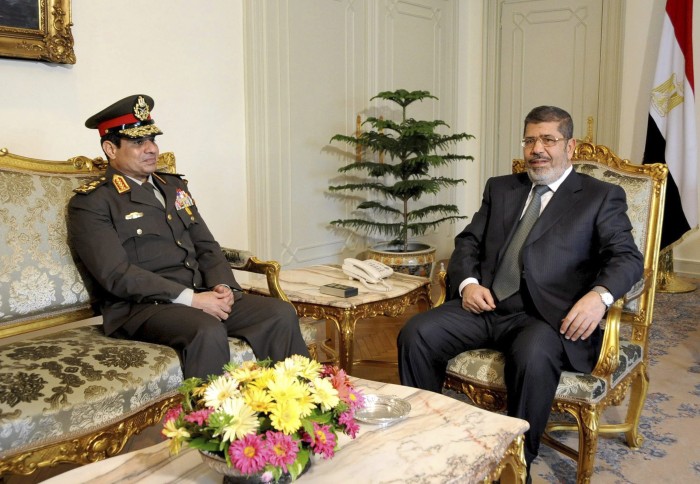History has again repeated itself as farce. This time, the protagonists were Mohammed Morsi and the head of Egypt’s armed forces, Abdel-Fattah Al-Sisi. On June 22, the General advised the President to take immediate steps to defuse a situation that was quickly spiraling out of control, to initiate a national dialogue, inclusive of all the opposition movements, and to express a commitment to building bridges across a highly fissured political landscape.

Egyptian Minister of Defense, Lt. Gen. Abdel-Fattah el-Sissi, left, meets with Egyptian President Mohammed Morsi at the presidential headquarters in Cairo, Egypt, Thursday, February 21, 2013.(AP Photo/Mohammed Abd El Moaty, Egyptian Presidency, File)
Morsi’s typically ham-handed response was to deliver a speech on national television that lasted over two and a half hours, blaming all the nation’s ills on the regime’s enemies. The rambling, maladroit address to the nation went so far as to call out judges by name for opposing the dictats he had issued designed to silence critics and further consolidate his hold on power.
And so it came to pass that after 369 days of misrule, Morsi and his Islamic Brotherhood were ousted by the military. Again faced with bad choices, the public welcomed this latest turn in what will surely be a long drama. Morsi’s key mistake was in equating a narrow electoral victory with what he called “constitutional legitimacy,” as if elections alone were sufficient to ensure the regime’s acceptance in the face of policies that were wildly unpopular even among his supporters, to the point where his hand-selected ministers resigned, and one was heard musing that the government was revolting against itself.
The structural problems that brought down Hosni Mubarak only worsened under Morsi. Unemployment grew sharply, inflation spiked to over 21% annually, and price and capital controls depressed the value of the Egyptian pound. In a country where food accounts for over 40% of average household expenditure, a growing number of Egyptians, especially the urban poor, suffer from malnutrition. As might be expected, black markets flourished, most tied to the Muslim Brotherhood. Meanwhile, public assets were sold off at bargain basement prices to Morsi’s cronies in the secret society.
Morsi’s key mistake was in equating a narrow electoral victory with what he called “constitutional legitimacy,” as if elections alone were sufficient to ensure the regime’s acceptance in the face of policies that were wildly unpopular even among his supporters.
It remains to be seen if the current caretaker government, composed mostly of technocrats who, one hopes, possess adequate administrative skills as opposed to simple-minded ideological constancy, can right the listing economy. Twelve billion dollars just pledged by Saudi Arabia, Kuwait and the UAE will help to ease the immediate burdens of the state.
Ironically, it may also contribute to a fundamental problem plaguing other societies in the region, namely accountability to the people. Governments that don’t rely on their citizens except at election time do not enjoy political legitimacy. Simply put, elections alone are not the end-all of a social contract between state and citizen. Note the nervousness in Ankara and Tehran about the turn of events in Egypt.
If a state sits on vast resources, as does Saudi Arabia, it can buy what it needs, including the acquiescence of a well-fed public. But Egypt is vastly different from its wealthy neighbor. It must institute sound economic policies that will attract foreign investment, revitalize the domestic economy, and generate the tax revenue necessary to underwrite the provision of basic services.
This is one tall order, and if history is any guide, the next government, whether appointed or elected, will be hard-pressed to turn matters around in dramatic fashion, which could risk further political turmoil. There will be more bread and more petrol in the short run to be sure, but don’t expect an economic miracle anytime soon.
Originally published by iPolitics
